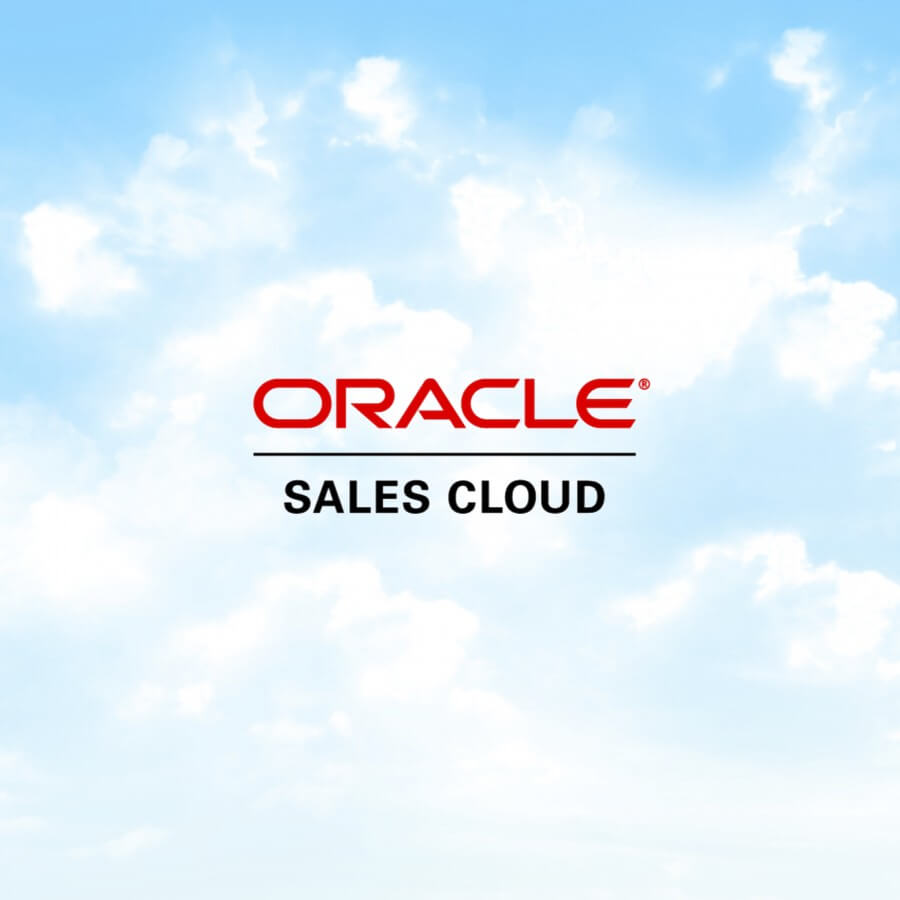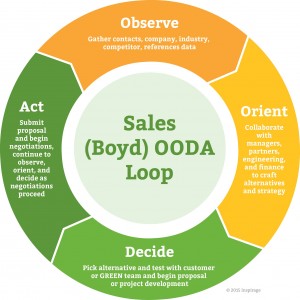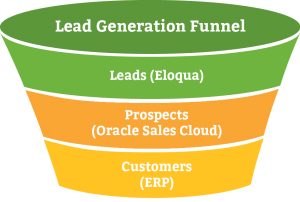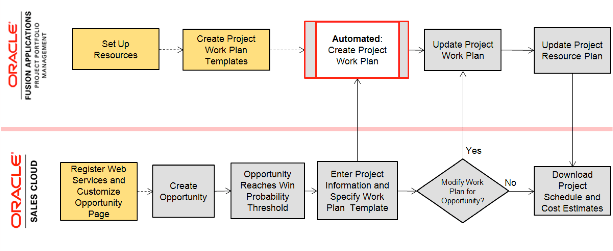Identifying, Shaping, and Winning Opportunities through Cross Team Collaboration
Oracle Cloud solutions for Sales, HCM, PPM, and Financials provide an integrated solution that enables cross team collaboration with unique capabilities for project oriented sales and delivery. I have enjoyed the distinct pleasure of working on the deployment of these end to end Oracle Cloud solutions for Inspirage’s production use. In my work with the Inspirage deployment team and our Cloud Center of Excellence (CoE) team, I have learned a great deal about the capabilities of the Oracle Cloud solution. In this article, I’ll share my perspective on how Oracle has created this seamless use of applications to support project oriented companies with global operations.

Oracle Cloud solutions for Human Capital Management (HCM), Customer Relationship Management (CRM), Financials, and Project & Portfolio Management (PPM) have been available for several releases and have their basis in years of development. However, it’s the thoughtful integration of all three solutions that provide the capabilities for the deployment of an integrated Sales, Delivery, and Accounting business process for project driven companies. This article will describe the integrated capabilities of the broader Oracle Cloud solution and how it delivers capabilities needed for project oriented sales teams to successfully Identify, Shape, and Win sales opportunities through cross team collaboration.
Before a company can focus on delivery and account management, it has to win the deal. I have participated on all sides of complex project oriented sales cycles for more than 30 years in my career working for the US Navy, government system contractors, Oracle Corporation, and my experience at Inspirage. Throughout, I have seen the need for improved life cycle sales process automation. Mark Cotteleer, Felissa Lee, and Edward Inderrieden foresaw the need in their July-August 2008 Harvard Business Review article “Selling the Sales Force on Automation” in which they called for “A system that would help coordinate the disparate, but highly interdependent activities of marketing, selling, and providing service, and the information that these systems contain can help senior executives make sales-related decisions.”
The sale of complex, highly customized or engineered B2B projects, products and services is very different from the selling of simpler, standard B2B or B2C products and services. It is the complex sales process where the integrated power of the Oracle Sales Cloud coupled with the Oracle Cloud Project & Portfolio Management (PPM) and Financials applications delivers a powerful sales force multiplier. This is the system that can provide the capabilities for an agile team of marketing, sales, project delivery, engineering, management, and accounting personal to effectively collaborate and accomplish their mission of higher sales win success.
 To help with understanding the advanced capabilities that oracle provides, let’s consider the concept of “OODA loop” as it applies to complex sales cycles. This term refers to the decision cycle of Observe, Orient, Decide, and Act, developed by military strategist and USAF Colonel John Boyd. This process is often referred to as the “Boyd Loop” because of the seminal change in thought and application he brought forward. Boyd applied the concept to the combat operations process, often at the strategic level in military operations. The Boyd “OODA” Loop is now also often applied to understand commercial operations and learning processes. The approach favors agility over raw power in dealing with human opponents in any endeavor. The sales team that executes the OODA Loop faster than the competition shapes the competition to its advantage and markedly increases its success.
To help with understanding the advanced capabilities that oracle provides, let’s consider the concept of “OODA loop” as it applies to complex sales cycles. This term refers to the decision cycle of Observe, Orient, Decide, and Act, developed by military strategist and USAF Colonel John Boyd. This process is often referred to as the “Boyd Loop” because of the seminal change in thought and application he brought forward. Boyd applied the concept to the combat operations process, often at the strategic level in military operations. The Boyd “OODA” Loop is now also often applied to understand commercial operations and learning processes. The approach favors agility over raw power in dealing with human opponents in any endeavor. The sales team that executes the OODA Loop faster than the competition shapes the competition to its advantage and markedly increases its success.
The combined sales/delivery/finance team that is quicker at gathering customer requirements, translating them into various performance and costs alternatives, and begins executing a capture strategy earlier is going to win more than their fair share of competitive opportunities.
Traditional sales force automation tools are primarily used to capture data fed into the system by the sales force that is then used to support oversight by the sales managers. The problem of missing data, incorrect data, or internally biased data is a problem in systems where the user feeds data into a system, but gains no value from their efforts in accomplishing their own goals. Oracle’s integrated Cloud Sales solution is built to support more than sales manager reporting. Rather it is first and foremost designed as part of a larger collaborative information sharing environment designed to flow information between marketing, sales, delivery, and finance to support end to end business processes. Instead of workload feeding the system and getting nothing back from it, the extended sales team is collaboratively building a winning solution, while reducing non-value added effort that occur with the use of disconnected best of breed systems, emails, and widely scattered document repositories that support most sales teams.
 At the start of the process the marketing and lead generation process is supported by Oracle’s Eloqua marketing application. The marketing team is able to rapidly generate sales campaigns and leads for the sales team. The data passed on includes not only a lead and sales contact, but can be enriched with company and competitive intelligence from sources like Hoover’s. Company hierarchies, contacts, industry data, and financial information is provided in the system rather than each individual having to find the information from various sources and enter into the sales system.
At the start of the process the marketing and lead generation process is supported by Oracle’s Eloqua marketing application. The marketing team is able to rapidly generate sales campaigns and leads for the sales team. The data passed on includes not only a lead and sales contact, but can be enriched with company and competitive intelligence from sources like Hoover’s. Company hierarchies, contacts, industry data, and financial information is provided in the system rather than each individual having to find the information from various sources and enter into the sales system.
Having qualified a lead the sales lead can now use the system to enter discovery notes and new contacts as well as find contract templates, customer references/past performances, information on similar solutions from previous projects, request engineering or operations pre-sales support, and create rough order of magnitude project resourcing/scheduling/pricing to share as appropriate with the internal team and the customer.
The access to sensitive business data like references, solutions, resource availability, and pricing are all controlled through the Single Sign On (SSO) capabilities of the Oracle Fusion Cloud and Oracle Documents. Price lists, costs, and resource availability are all taken from the HCM, SCM, and Financial systems with zero latency and no spread sheets involved. Accurate estimates of project costs, schedule, and profits associated with various price and performance alternatives are built collaboratively with the delivery team using Oracle projects and shared across the sales, delivery, and financial teams without the use of spreadsheets. Resource contention between projects is identified long before delivery begins and staffing or sourcing solutions are created to relieve the constraints.
The delivery team working from a single source of truth for future resource requirements and improved S&OP processes can improve recruiting, staffing and resource allocation. Job categories, skill levels, burden rates, and pricing are consistent across the HCM, Project Management, and the proposal development team members eliminating much of the tedious work of proposal development and profitability analysis that is caused by the constant flow of spreadsheets and reports flowing from disconnected systems.
The functional flow between the Cloud Sales and PPM applications is shown below:

As a result of taking into consideration the end to end enterprise sales process and then supporting it with the most advanced applications and technologies available in the cloud, the sales force won’t have to be cajoled or threatened into using the system, but will readily use it and win because of it. A few of the capabilities of Oracle Sales Cloud are listed here:
- Provides an easy-to-learn and easy-to-use interface that includes mobile devices and a disconnected interface via MS Outlook
- Provides one stop shopping for access to all of the customer, company, and competitive intelligence the sales force needs
- Reduces the data entry and research workload associated with disconnected best of breed systems
- Improves sales force and delivery team efficiency by reducing meeting times and emails needed to coordinate the teams capture activities
- Reduces tedious frustrating labor caused by extracting data and sharing of spreadsheets for costing, pricing, scheduling, and profitability analysis
- Improves the sales force win rate and sales force morale
- Reduces the integration and maintenance burden on the IT department
- Increases information security with SSO, role based access, and tight control of sensitive data
If you were a salesperson, wouldn’t you want these things?
I consider myself fortunate to have worked for Inspirage for several years and to have participated in our recent deployment of Oracle Eloqua, Oracle Sales Cloud, Financials Cloud, PPM, and Documents Cloud. The design and deployment of this solution enabled me to work with many members of the Oracle product team to understand the simplicity and advanced use of the model. There is an art and a science at work here and I am sure that companies that sell projects or standard products will benefit greatly from this sales automation product.
For those of you whom are not familiar with Oracle Fusion Cloud strategy, my colleague at Inspirage, Jay Ramaswamy, has written an excellent piece, “What is Oracle Fusion Cloud and Why Does It Matter“ that I encourage you to review. It will provide more information about Oracle’s overall cloud application architecture and why it is a breakthrough technology for enterprise business process automation from innovation to execution.
Please feel free to reach out to me for any questions on this article or the Oracle Sales Cloud solution.